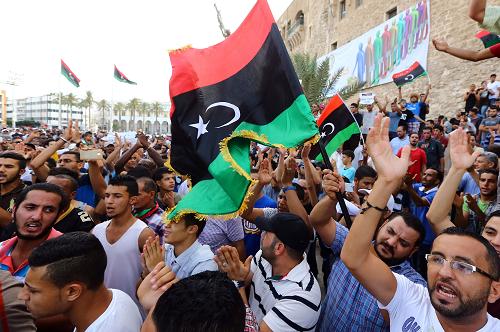Renewed civil war is inescapable in Libya
- By Wang Jin
 0 Comment(s)
0 Comment(s) Print
Print E-mail China.org.cn, August 1, 2014
E-mail China.org.cn, August 1, 2014
|
|
|
Libyans condemn and urge for an end of war during a protest at the downtown Tripoli on July 31, 2014. [Xinhua photo] |
The situation in Libya recently has become more severe, as clashes between different militias have intensified. Recently, fierce clashes erupted between Misrata militia and government forces around Tripoli's international airport, and a large number of aircraft were blown up.
In fact, the civil war and deadly clashes have been going on for years. After former president Muammar Gaddafi was toppled, conflicts began to emerge. Complication and confusion arose from different political ideas, tribal affiliation, regions and backgrounds, sending Libya into chaos.
In 2011, Muammar Gaddafi was captured and killed by NATO militants in his hometown of Sirte. Since then, Libya has been in an "anarchy," attracting various political and military factions to fight for the regime. But this time, such a large-scale armed conflict seems to be leading to a "decisive war" in the country.
The complex situation among different armed forces makes the conflicts in Libya severe. Currently, the main contradiction appears between pro-secular militia and armed Islamist groups. On May 4, Ahmed Miitig was elected the new prime minister in the interim government under the support of religious forces. But soon, retired Libyan general Khalifa Haftar publicly announced that he did not recognize the legitimacy of the election and announced the dissolution of the General National Congress. Haftar believed that his military action was not a "coup", but in accordance with the wishes of the people fighting.
As a former army general, Khalifa Haftar represents the power of the pro-secular militia and military forces. Since the fall of Muammar Gaddafi, Haftar has always criticized the extremism and terrorism in Libya. In May this year, under the support of military forces, Haftar launched a military offensive targeting Islamist militia, including Ansar al-Sharia (AS) and the February 17 Brigade, in the eastern Libyan city of Benghazi. Haftar's forces included approximately 6,000 soldiers, supporting aircraft and heavy weaponry focusing on the al-Quwarsha, Sidi Faraj and al-Hawari areas of the city. The supporters behind Haftar mainly include former military officers, politicians, and other political forces in favor of secularity. When Haftar raised a "rallying cry," all parties and forces gathered quickly to fight.







Go to Forum >>0 Comment(s)